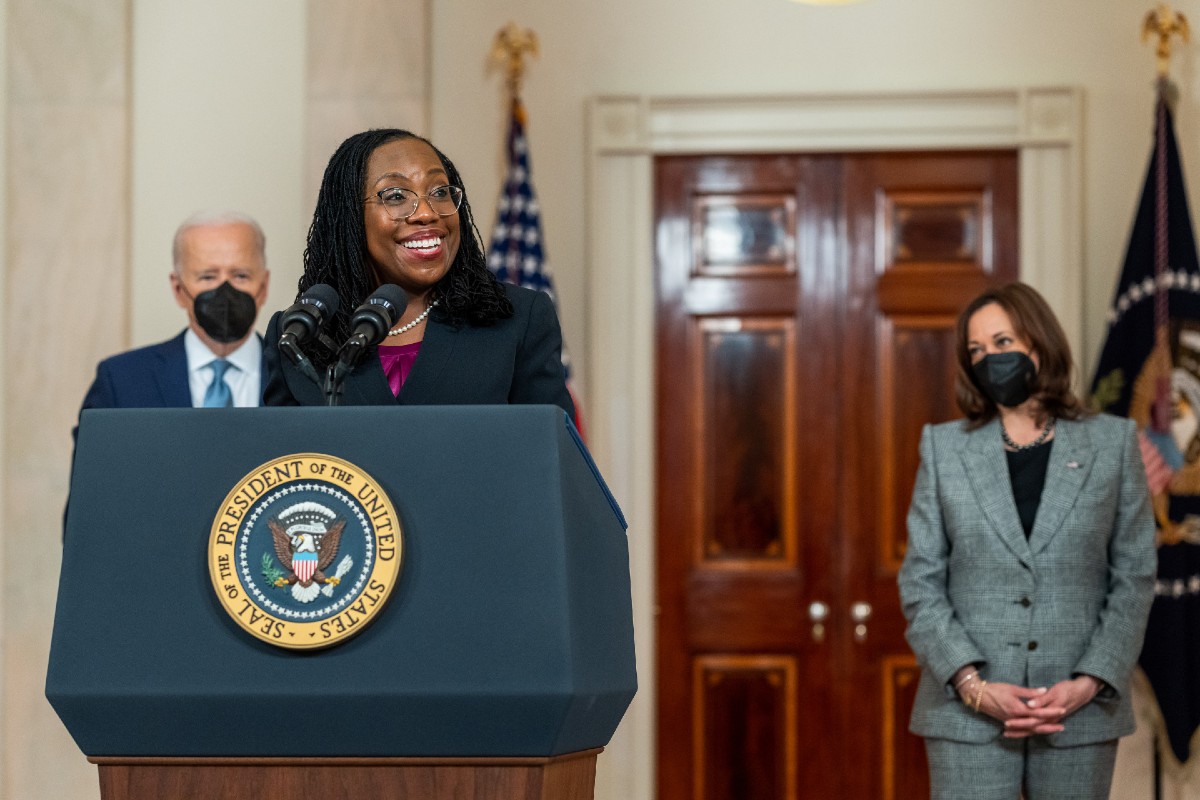STATEHOUSE REPORT | ISSUE 21.14 | APRIL 8, 2022
BIG STORY: S.C. Democrats laud role in vote for first Black Supreme Court justice
NEWS BRIEFS: Teaching, abortion bills miss crossover deadline
LOWCOUNTRY, Ariail: It’s all politics
COMMENTARY, Brack: Hoping the blind can stop leading the blind
SPOTLIGHT: The S.C. Education Association
FEEDBACK: On tyranny of the majority and gerrymandering
MYSTERY PHOTO: Three flags
S.C. Dems laud role in vote for first Black justice

By Andy Brack | Candidate Joe Biden’s pledge on the Gaillard Center’s stage during a 2020 Democratic presidential primary debate led to the Thursday vote in the U.S. Senate to confirm U.S. Court of Appeals Judge Ketanji Brown Jackson to the U.S. Supreme Court.
Jackson is expected to take her seat on the Supreme Court when current Justice Stephen Breyer, 83, retires at the end of the current term, which formally ends in early October. Jackson clerked for Breyer from 1999 to 2000.
During a 2020 presidential debate, Biden answered a question about his values: “when you get knocked down, get up, and everyone’s entitled to be treated with dignity.” He then pivoted to this pledge: “I’m looking forward to making sure there’s a Black woman on the Supreme Court to make sure we in fact get everyone represented.”
Biden, who had not performed well in the early New Hampshire and Iowa elections, went on to win in South Carolina, which acted as a slingshot for victories days later in Super Tuesday primaries across the nation. He beat incumbent President Donald Trump that November.

U.S. Rep. Jim Clyburn, who endorsed Biden in what was seen as the role of a kingmaker, wanted U.S. District Judge Michelle Childs of South Carolina to be the next Supreme Court justice. But he said Thursday that Jackson would become an extraordinary justice.
“Judge Jackson demonstrated her ability to rise above great challenges and meet the moment,” he said Thursday in a statement. “She stands as a shining example of the depth and breadth of talent among a diverse pool of jurists who, if empowered to serve, will help ensure that justice in this country is fair and equitable for all.”
Clyburn also said Biden fulfilled his 2020 pledge by nominating Jackson and helping her to get confirmed. Democratic National Committee Chair Jaime Harrison of South Carolina agreed Thursday in Columbia, adding, “Today proves once again that a Black woman can accomplish anything. She can be vice president of the United States. She can shape the future of our nation. And now, she will serve on the highest court in the land. And I’m proud that the reason why this happened is because of Democrats here in the great state of South Carolina.”
Jackson’s confirmation is big deal for Black women
Democratic gubernatorial candidate and state Sen. Mia McLeod of Columbia said Jackson’s confirmation was a huge step toward progress in the United States.

“I celebrate her today because her voice and her identity matter,” McLeod told Statehouse Report. “Today, Black women are represented in a way that we have never seen.
“Black women are the cornerstone of progress. We nurtured and fought for this country even when we were not allowed to reap the benefits of our labor. Black women are continually underrepresented in leadership. From civic life to our communities. I hope today’s confirmation of Justice Jackson will turn the tide for Black women in our country.”
State Rep. Jerry Govan, D-Orangeburg, said his mother, who died in 2014 at age 99, would have been happy with Thursday’s 53-47 vote to confirm Jackson. Her reaction likely would have been, “‘Praise God, it’s been a long time a-coming,’” he said.

Govan, who is running to be state superintendent of education, added, “Democracies have always thrived on diversity by providing equal access and inclusion. The fact that we are just now at this point, getting around to elevating the first African American woman to the U.S. Supreme Court, considering the major contributions and roles that Black women have played in the women’s suffrage and civil rights movements, gives my four daughters and three granddaughters a sliver of hope.”

State Rep. Wendy Brawley, D-Richland, said Thursday’s Senate vote was a demonstration that the country was committed to living up to its promise.
“Judge Ketanji Jackson’s selection as the next Supreme Court Justice is such a point of pride for all women but especially for Black women who have for so long been denied representation on the court.”
She added that she would have loved for South Carolina’s Childs to have been elevated to the high court, but she looked forward to confirmation of Childs’ nomination to the powerful U.S. Court of Appeals for the District of Columbia Circuit.
Furman University political scientist Danielle Vinson added African American women have been fighting for civil rights for more than a century.
“They played prominent roles in winning voting rights for women and racial minorities nationally and desegregating schools and other institutions in South Carolina and around the country,” she said. “It’s only right that an African American woman has finally ascended to the bench that is responsible for protecting those rights and our Constitution into the future. It’s also important for girls and young women to see themselves in these roles. It’s easier to become something when you see it really is possible.”
- Have a comment? Send to: feedback@statehousereport.com.
Teaching, abortion bills miss crossover deadline

Staff reports | After Democrats put up 1,000 amendments in an ultimately unsuccessful attempt to derail a bill requiring student athletes to compete on teams that correspond to their gender at birth, the House gave passes to controversial abortion and teaching bills, according to observers.
“We got bogged down. People just didn’t want to go through another in-depth debate,” Spartanburg County GOP Rep. Rita Allison told The Post and Courier. “Knowing the number of amendments that were on it and where that would keep us and how long we’d be here, a lot of people just didn’t have the appetite for it, on both sides.”
House lawmakers decided not to take up the abortion and teaching bills before the so-called “crossover deadline.” After April 10, bills in one chamber have to receive a supermajority to be considered by the other, which means controversial measures have a tougher time moving forward “after crossover.”
The anti-abortion proposal would have required women using an abortion pill to end a pregnancy to read a statement that doctors and advocates disputed as misinformation. Bills related to teaching focused on so-called “critical race theory” which isn’t even taught in South Carolina. Critics, however, said proposals would have limited classroom teaching.
In other recent news:
![]() S.C. Senate votes to ban employer vaccine mandates. The state Senate approved a bill April 6 that prevents employers requiring a COVID vaccination mandate and businesses from denying services from unvaccinated.
S.C. Senate votes to ban employer vaccine mandates. The state Senate approved a bill April 6 that prevents employers requiring a COVID vaccination mandate and businesses from denying services from unvaccinated.
S.C. schedules 1st execution with firing squad. South Carolina scheduled its first execution after corrections officials updated the death chamber to prepare for executions by firing squad. The execution is scheduled for April 29.
Hearing set for Upstate Republican charged with 133 ethics violations. S.C. Rep. Jonathan Hill, R-Anderson, faces 133 ethics charges, including allegations he spent campaign money on a personal mortgage. He will have a chance to defend himself later this month.
S.C. House moves to replace USofC Board of Trustees. The state House of Representatives this week voted overwhelmingly to replace and restructure the University of South Carolina’s governing board.
Two GOP candidates for S.C. superintendent who lack master’s degree withdraw. Two of the eight GOP candidates for state superintendent have withdrawn from the race, acknowledging they lacked an almost-forgotten qualification for the job – a master’s degree.
Busy hurricane season projected with 19 named storms, 9 hurricanes. A forecast from Colorado State University’s Tropical Meteorology Project calls for 19 named storms, nine hurricanes and four major hurricanes of Category 3 or higher. Forecasters say the season is expected to be more active than usual. Last year, for example, was the third most active season on record with 21 named storms, including seven hurricanes.
Class-action suit filed on behalf of AME ministers. African Methodist Episcopal ministers who have seen more than 70 percent of a church retirement fund lost in recent months have filed a class action lawsuit against the church in an attempt to recover millions of dollars in pension monies. One of the defendants is a South Carolina bishop. The denomination, with strong historical roots here, has about 600 churches in South Carolina.
- Want more headlines every business day that are like this? Visit our friends at SC Clips.
It’s all politics

Cartoonist Robert Ariail often interprets things a little differently, but always has an interesting take on what’s going on in South Carolina. Love the cartoon? Hate it? What do you think: feedback@statehousereport.com.
Hoping the blind can stop leading the blind

By Andy Brack | Now comes the South Carolina General Assembly, a group of elected officials who often don’t need any help in being considered a certified mess, as actors insert themselves into a leadership imbroglio of zealous trustees at the University of South Carolina.
 It’s a two-part play – The Dysfunctional React to Change the Dysfunctional – that, so far, has an unsurprising encore. Maybe there’s a better way.
It’s a two-part play – The Dysfunctional React to Change the Dysfunctional – that, so far, has an unsurprising encore. Maybe there’s a better way.
After years of ignoring board leadership shortcomings at the state’s flagship university, the legislature now finds itself in the unenviable position of trying to sort out a board of trustees that has run amok. It’s not the first time lawmakers have let a situation fester until they had to swoop in and fix what they should have fixed long before. Just look back to recent years when they had to deal with a failed nuclear construction project that cost billions and when they essentially hit a reset button with leadership at S.C. State University.
What’s been going on lately with board leadership at UofSC (that’s what we call it now) has morphed, festered and spread like rust. The large, unwieldy board, members of whom have to play serious politics with the legislature to get appointed in the first place to what should be a non-political fiscal oversight role over eight campuses and 50,000 students, has bitten off too much:
- Too many trustees have served too long, which has fostered an environment of coziness and entitlement, both of which were fueled by the legislature not paying enough attention all along.
- USofC’s secretive, inept, good-old-boy searches for a new president with questionable input by the state’s governor was the first act of the play that ended with the resignation of that president after allegations of plagiarism. A subsequent search saw a top candidate withdraw, in part, because of all of the dysfunction.
- Act Two highlights the board’s meddling which, some charge, led to improper insertion into the school’s athletic program and multi-million-dollar buyouts of mediocre coaches in ongoing, Sisyphean attempts to have winning seasons.
- And now as some of the longtime trustees are trying to win reappointment by the legislature to keep their jobs comes another smudge over whether the board’s chair lives in the USofC district he’s supposed to represent.
It’s all a public relations nightmare. But wait, it can become a public policy horror story as the General Assembly, almost on cue as an encore, enters to “save the day.” Translated into regular English, that means another knee-jerk solution to something lawmakers should have fixed long ago.
Here’s a suggestion: Rather than float in with another ill-conceived rush-job of a way to reform governance at the University of South Carolina, slow down and:
- Fire any trustees who you’re unhappy with. Just get rid of them. That’s why lawmakers have the ability to make – and break – appointments. Then put people in there who will be responsive and open, providing the oversight that the university system needs to get back on track.
- Instead of reacting with another last-minute plan that’s fated to have unintended consequences, spend a little time to come up with a real reform plan for university governance after analysis of what’s working and what’s not working. Yes, such a plan probably means a smaller board. But also look at how this board – and all other university boards in the state – function so the same problem with another college doesn’t pop up in a few short years. In other words, fix the problem. Don’t wallpaper over it.
- Review the whole process of how people are appointed to college and university boards and make sure those who are awarded the positions understand what they should do and not do.
Taxpayers expect good governance at the Statehouse and on state university campuses. The legislature should fix dysfunction at USofC – but in a way that makes real changes and isn’t just more hyperventilating overreaction.
Andy Brack is publisher of the Charleston City Paper and editor and publisher of Statehouse Report. Have a comment? Send to: feedback@statehousereport.com.
The S.C. Education Association
 The public spiritedness of our underwriters allows us to bring Statehouse Report to you at no cost. This week’s spotlighted underwriter is The South Carolina Education Association(The SCEA), the professional association for educators in South Carolina. Educators from pre-K to 12th grade comprise The SCEA. The SCEA is the leading advocate for educational change in South Carolina. Educators in South Carolina look to The SCEA for assistance in every aspect of their professional life. From career planning as a student to retirement assessment as a career teacher, The SCEA offers assistance, guidance, and inspiration for educators.
The public spiritedness of our underwriters allows us to bring Statehouse Report to you at no cost. This week’s spotlighted underwriter is The South Carolina Education Association(The SCEA), the professional association for educators in South Carolina. Educators from pre-K to 12th grade comprise The SCEA. The SCEA is the leading advocate for educational change in South Carolina. Educators in South Carolina look to The SCEA for assistance in every aspect of their professional life. From career planning as a student to retirement assessment as a career teacher, The SCEA offers assistance, guidance, and inspiration for educators.
- Learn more: TheSCEA.org
Tyranny of the majority
To the editor:
![]() In Washington, the checks and balances to mitigate the tyranny of the majority has morphed into the tyranny of the minority. Just the reverse is true in South Carolina as the state [Republican] PParty has harmonized its priorities with the Trump wing.
In Washington, the checks and balances to mitigate the tyranny of the majority has morphed into the tyranny of the minority. Just the reverse is true in South Carolina as the state [Republican] PParty has harmonized its priorities with the Trump wing.
The short-term answer is a Democratic governor, a la North Carolina, and turning purple South Carolina Republicans need to arrange an Intervention to self correct, followed by an Exorcism of Trump.
– George Swindell, Greenwood
Gerrymandering is an anathema in a democracy
To the editor:
Gerrymandering is an anathema to democracy and your analysis is spot on, as far as it goes. You suggest that gerrymandering results in partisanship. I believe that gerrymandering results in not just partisanship, but EXTREME partisanship.
As you point out, the Statehouse is gerrymandered in such a way as to advantage one party over the other. This results in a primary challenger winning the safe seat. Why should the opposite party field a candidate if the safe seat is predetermined? In the case when the primary winner wins the general election, the seat moves further away from the center, regardless of party, and in essence becomes more extreme. For example, [U.S. Rep.] Tom Rice has no less than 10 primary candidates running for his seat, most of whom are further right of him. It is more than likely that Mr. Rice will lose his seat in the upcoming primary, thus moving the seat further to the right of center and becoming more extreme.
Gerrymandering also occurs with the state Senate and congressional House seats. When enough safe seats emerge in a state or congressional chamber, the party in power is less likely to seek compromise with the party out of power. As a result, the party in power passes bills not representative of the public at large or results in gridlock.
Gerrymandering affect’s statewide elections as well. When there is a safe seat, the voters are less likely to come out to vote. Why should they? The winner of the safe seat is a foregone conclusion and, as a result, the vote for the state office leans toward the party in power.
Both the state House and Senate have bills languishing in their respective Judiciary committees that would place on the ballot a constitutional amendment establishing an independent citizen’s commission to draw legislative lines every 10 years. Ten states have already established commissions or other mechanisms to eliminate or reduce legislative influence over redistricting. The 2021 redistricting plan shows that South Carolina needs to adopt an independent citizen’s commission. There is overwhelming support for such a commission in the general public.
– R. Michael Rahenkamp, Florence
- Have a comment? Send your letters or comments to: feedback@statehousereport.com
Three flags

So the hints with this mystery are that the picture was taken in a port city in South Carolina. But where, specifically, and why are these three flags flying together? Send your guess to feedback@statehousereport.com — and remember to include your name, home city and contact information.
 Last week’s mystery, “Blue shutters,” was a tough one, but it showed S.C.-flag related features on shutters at 40 Tradd Street in Charleston.
Last week’s mystery, “Blue shutters,” was a tough one, but it showed S.C.-flag related features on shutters at 40 Tradd Street in Charleston.
Congratulations to the five readers who identified the specific location: George Graf of Palmyra, Va.; Allan Peel of San Antonio, Texas; Jay Altman of Columbia; David Lupo of Mount Pleasant; and Pat Keadle of Wagener;
Peel shared more about the photo of shutters on one of a pair of buildings built around 1718: “Historical records indicate that the pair of 2-1/2 story buildings at 38 and 40 Tradd Street were built using bricks that were recovered from the ballast of a ship that arrived in Charleston’s Harbor several years earlier. These two structures are known as “The Bullock Buildings” and were spared from destruction during the plague of fires that swept through the area in 1838 and again in the ‘Great Fire of 1861.’ Their survival makes the Bullock Buildings among the oldest houses in Charleston.”
- Send us a mystery. If you have a photo that you believe will stump readers, send it along (but make sure to tell us what it is because it may stump us too!) Send to: feedback@statehousereport.com and mark it as a photo submission. Thanks.
- ORDER NOW: Copies are in Lowcountry-area bookstores now, but if you can’t swing by, you can order a copy online today.
- Now available as an e-book!
ABOUT STATEHOUSE REPORT
Statehouse Report, founded in 2001 as a weekly legislative forecast that informs readers about what is going to happen in South Carolina politics and policy, is provided to you at no charge every Friday.
- Editor and publisher: Andy Brack, 843.670.3996
Donate today
We’re proud to offer Statehouse Report for free. For more than a dozen years, we’ve been the go-to place for insightful independent policy and political news and views in the Palmetto State. And we love it as much as you do.
But now, we can use your help. If you’ve been thinking of contributing to Statehouse Report over the years, now would be a great time to contribute as we deal with the crisis. In advance, thank you.
Buy the book
Now you can get a copy of editor and publisher Andy Brack’s We Can Do Better, South Carolina! ($14.99) as a paperback or as a Kindle book ($7.99). . The book of essays offers incisive commentaries by editor and publisher Andy Brack on the American South, the common good, vexing problems for the Palmetto State and interesting South Carolina leaders.
More
- Mailing address: Send inquiries by mail to: P.O. Box 21942, Charleston, SC 29413
- Subscriptions are free: Click to subscribe.
- We hope you’ll keep receiving the great news and information from Statehouse Report, but if you need to unsubscribe, go to the bottom of the weekly email issue and follow the instructions.
- Read our sister publication: Charleston City Paper (every Wednesday in print; Every day online)
- © 2022, Statehouse Report, a publication of City Paper Publishing, LLC. All rights reserved.


